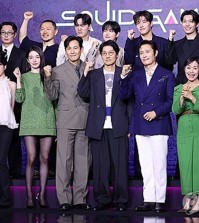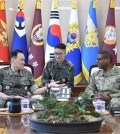- California Assembly OKs highest minimum wage in nation
- S. Korea unveils first graphic cigarette warnings
- US joins with South Korea, Japan in bid to deter North Korea
- LPGA golfer Chun In-gee finally back in action
- S. Korea won’t be top seed in final World Cup qualification round
- US men’s soccer misses 2nd straight Olympics
- US back on track in qualifying with 4-0 win over Guatemala
- High-intensity workout injuries spawn cottage industry
- CDC expands range of Zika mosquitoes into parts of Northeast
- Who knew? ‘The Walking Dead’ is helping families connect
Martha Choe looks forward to life after Gates Foundation
By Tae Hong
Martha Choe, 59, is all about following the rhythm of life as she prepares to step down from her post as the chief administrative officer of the Bill & Melinda Gates Foundation in September after 10 years with the influential organization.
“I have long aspired to lead a more balanced portfolio of a life,” she said in a phone interview. “There is a rhythm of life. There is a rhythm that each of us have, and I think it felt more and more that it was really time to complete this amazing chapter and think about what’s next.”
A natural rhythm was what spurred her to leave her two four-year terms as a Seattle city councilwoman, a role in which she was the first Korean American ever elected into a city council in the country.
It carried her through many more roles — as a high school teacher, as a vice president at the Bank of California Credit Administration, as the director of the Washington State Department of Community, Trade and Economic Development, as the chair of the White House Commission on Asian American and Pacific Islanders — before 2004, when she joined the Seattle-based foundation as the director of the Global Libraries initiative.
Choe said her journey with one of the largest private foundations in the world has been remarkable, from her central role in growing the workforce of the organization from 200 to 1,300 people to being the driving force behind the building and designing of a new Seattle campus.
It’s now time to move on, but there’s more work to be done, she said.
Before she dives back to work — an undecided path, for now — she plans to visit South Korea, the birthplace of her parents, to celebrate her 60th birthday. Called hwan-gap, the number was considered a celebration of longevity in older times but is now seen as a milestone in Korean culture.
Seeing Korea’s growth as someone who first visited the country in 1974 as a second-generation Korean American has been nothing short of amazing for Choe, especially as she witnessed partnerships between Korea and the foundation in the last few years.
Korea is the only example of a country that transitioned from receiving development aid following the Korean War to becoming a donor of aid, she said.
“There’s really no other country that has exemplified the success of that kind of journey,” Choe said. “The country’s decision to partner with others and invest in education, in health, in agriculture, in infrastructure — it really is an incredible role model for what is possible.”
Although Choe was born in New York City and has her heart in Seattle, a city she considers home, she’s also proud to have a Korean name, Choe Chung-wha, and to have helped build the Asian Pacific Islander American community.
“As a daughter of an immigrant, there’s a very special experience growing up in this country, having a foot in two cultures,” she said. Not many Korean Americans lived in the city in her generation. “So as I grew up, there was something very compelling about a shared Asian American experience, whether it was Japanese or Chinese or Korean. I think that’s what always resonated for me.”
After spending time on the White House Commission, she said what she sees as a challenge for the APIA community is to help policymakers understand that the Asian community is a diverse one. Although the APIA community is one of the most effective ones in terms of capabilities and impact due to prominent leaders in political non-profit organizations and the private sector, Asian Americans still experience disparity, and there is a need to address those divides, she said.
Choe will continue to help people understand the power of their voice and the influence they could have by encouraging participation in the community. She will also continue to reside in Seattle, where she will work out the next chapter in her life.
“For me, part of it is the journey toward discovering where else I can be useful and have an impact, and at the same time have a journey that’s fulfilling for me as well,” she said. “It’s a really, really exciting time for me.”


















Pingback: Martha Gates Foundation | driveway gates
Pingback: Martha Choe Gates | plastic - chainlinkfence